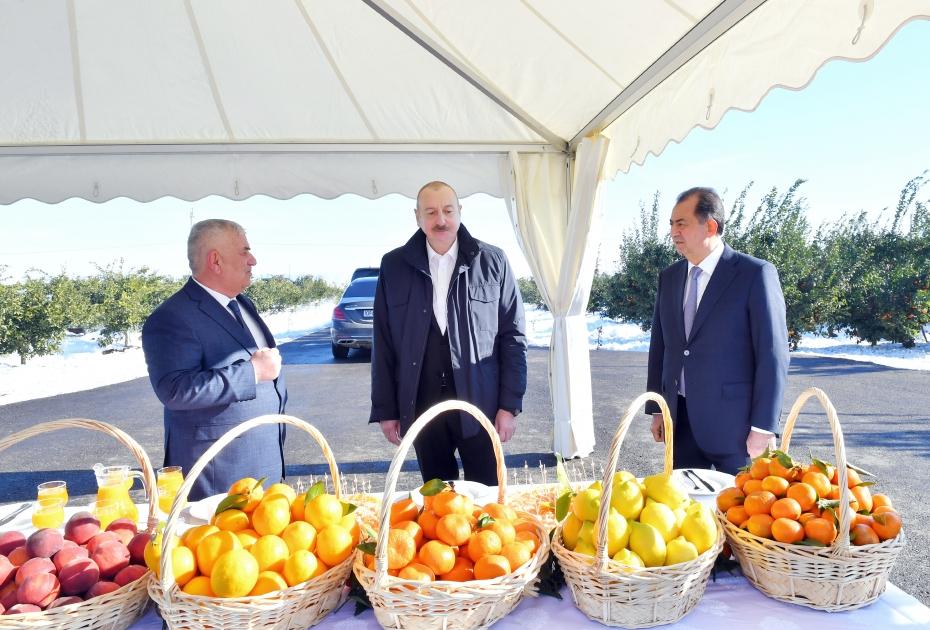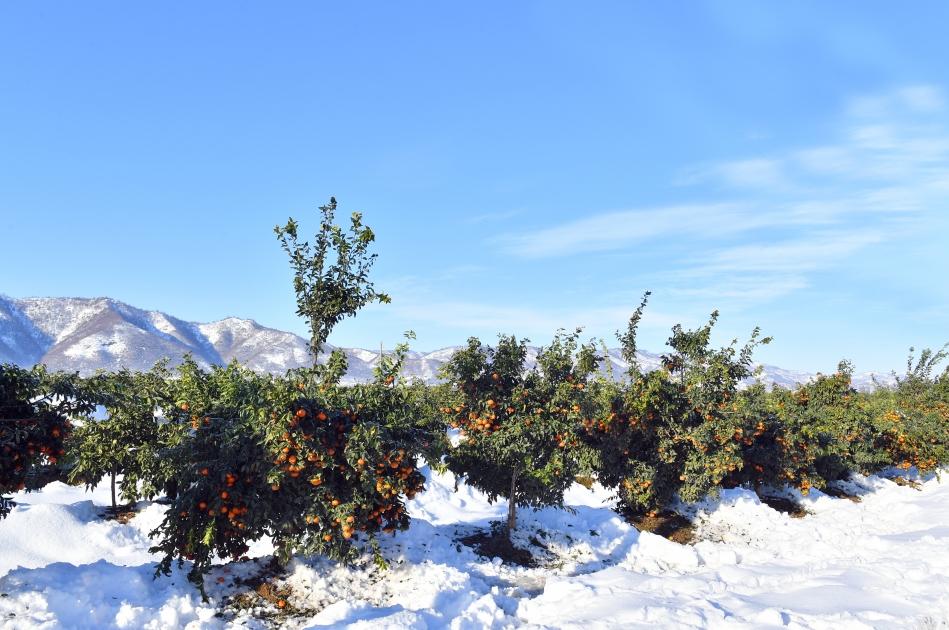Azerbaijan opens up new planting areas, citrus exports target global markets Analysis by Caliber.Az
The cultivation of tea, rice and citrus fruits has been the priority for the development of the agricultural sector in the southern subtropical region of Azerbaijan for about a century. As part of several state programmes for the socio-economic development of regions implemented since 2004, many projects have seen the light of the day in the Lankaran-Astara economic region to expand citrus plantations and create storage and processing facilities.
In 2018, the industry received an additional boost. The State Programme for the Development of Citrus Growing for 2018-2025 was approved. The interest in the development of the industry continues unabated: the day before, as part of a trip to the Lankaran district, the President of Azerbaijan, Ilham Aliyev, viewed the conditions created in the recently planted citrus grove of Lenk Frut LLC.
According to tradition, the head of state participates in the inauguration of production and social facilities, acquaints himself with the activities of industrial and agricultural enterprises, and meets with the local business community and the public during his visits to the regions of the country.
This visit to Lankaran was no exception, during which President Ilham Aliyev familiarized himself with the conditions created in the recently built modern prison complex, participated in the opening of the ASAN xidmət regional centre, visited the Laran LLC bakery, and also saw the modern agricultural complex Lenk Frut LLC in the village of Separadi, which specializes in the cultivation of citrus and other fruits.

During the visit to the agricultural complex, the director of Lenk Fruit Ltd, Namik Jabiyev, informed the head of state about the work being carried out in the new citrus fruit plantation. The total area of fruit plantations is 150 hectares, where 141 thousand citrus, peach and nectarine trees, mainly imported from Türkiye, have been planted. A modern network of economical drip irrigation is used in the complex to optimise agro-technical work.
In addition, for the first time in the country, 15 units of special equipment worth $2.2 million have been installed in the citrus grove to maintain the necessary temperature balance during the winter months. One unit of this equipment protects nine hectares of land from frost, and there are plans to install five more units in the coming years.
The use of modern equipment, advanced agronomic techniques and high-yielding varieties helps to reduce costs and increase productivity. The intensive horticulture farm currently has 110 hectares of mandarin and lemon orchards, 20 hectares of peaches, 5 hectares of nectarines and 7 hectares of berry plantations. The yield of the citrus plantations will be 35-40 tonnes per hectare, which is 2-3 times higher than local varieties.
In the season of the 2023-2024 economic year, the complex harvested 3 thousand tonnes of fruit, and the harvest is still going on. The fruit is sold on the local market and exported to Russia. Preparations are underway for future expansion of the farm, including the creation of citrus terraces in the foothills. To date, 140 people are employed on the farm and the number of employees will gradually increase in the next phase as the orchards expand.
It should be noted that Lenk Fruit owes the successful development of the project to the effective use of public-private partnership mechanisms. For the implementation of the LLC project, with a total cost of $6.2 million, a soft loan of $588,000 was provided by the Entrepreneurship Development Fund (SIF); in turn, the Agrarian Credit and Development Agency under the Ministry of Agriculture provided a loan of $87,000.
It is worth noting that this is not the only example of state support for fruit growers. In recent times, the development of intensive fruit growing has been a priority in the agricultural sector. In particular, according to Firdovsi Fikretzada, Director of the Centre for Agricultural Research under the Ministry of Agriculture, the cultivation of cherries, sour cherries, plums, apricots and peaches is a relatively new commercial direction in agriculture, a trend of recent years.
In the opinion of the director, the export of stone fruits in 2022 will be more than 60,000 tonnes, which is a historical record. The production and export of hazelnuts and almonds is developing very successfully. On the other hand, the production of citrus fruits is expected to grow. In 2022, the country's farms will export 4.5 thousand tonnes of these products.
Regarding citrus production, it should be noted that Azerbaijan has not yet achieved full import substitution in this segment; the country imports around 30-40 thousand tonnes of products from foreign markets each year. Türkiye is the main foreign supplier of oranges, mandarins and lemons, Iran imports kiwis, Egypt imports oranges and Georgia imports small quantities of mandarins.
However, given the favourable climate and soil quality in Azerbaijan's subtropical regions, it is much more optimal to increase domestic citrus production, especially as our fruit is of better quality and grown using organic technologies.
Unfortunately, the origins of the problems of the industry and the reduction of citrus orchards date back to the 90s of the last century: the collapse of economic relations in the post-Soviet space, problems with logistics did not favour the growth of exports, and the small size of the local market reduced the interest of farmers to increase production. The lack of modern storage and processing facilities in those years was also a negative factor.
During the implementation of the first three state programmes for the socio-economic development of the regions, mainly in the Lankaran and Astara regions, a tangible shift took place in the years 2004-2016.
Industry support efforts increased significantly after the Head of State approved the State Citrus Development Programme 2018-2025 in 2018. The main objective of the State Program, which will be funded primarily from the budget and via the SIF, the Azerbaijan Investment Company and structures of the Ministry of Agriculture, is to support local producers in order to increase the annual production of citrus fruits in Azerbaijan to 100,000 tonnes.
Efforts to encourage the development of intensive horticulture, including promoting citrus production to target foreign markets, have significantly increased farmers' interest in recent years. In particular, as part of the Young Farmers Support Project for 2019, the Agricultural Credit and Development Agency has allocated 51 hectares of land in 28 villages in the Lankaran district to 260 young farmers to grow lemons. Similar work has been carried out in other districts in the subtropical region, including the rehabilitation of 100 hectares of citrus plantations for 300 young farmers. P
lanting projects have also been active in the Astara district in recent years. Last year, for example, more than 16,000 mandarin seedlings of the Turkish varieties Okidsu and Mihovaze were planted in a new 25-hectare intensive citrus orchard in Astara. A modern water-saving irrigation system was also installed in the orchard.
At the same time, a programme of government subsidies is being implemented to maintain the interest of entrepreneurs in developing the industry. For example, flat-rate subsidies are currently being provided for the establishment of intensive citrus farms: $6,820 for lemon and kumquat plantations and $5,650 for mandarin and orange plantations.
These and other initiatives have contributed to the expansion of citrus plantations: the area of orchards has increased by 2.3 times compared to 2015, reaching 4.41 thousand hectares by 2022. At the beginning of last year, three-quarters of all plantations were mandarin orchards - almost 3,084 hectares, followed by lemon plantations (732.2 hectares), and orange trees on an area of just over 591 hectares, including 100 hectares of hallabon (a hybrid of orange and mandarin). In the south of the country, feijoa production is quite developed, with relatively smaller plantations of grapefruit, kiwi, kumquat, etc.

However, expansion of plantations and increasing yields are not the only conditions for successful development of the industry, citrus crops are extremely sensitive to frost, and fruit-bearing trees need to be protected in winter using modern technologies.
In turn, the harvested fruit must also be stored in special storage facilities with strict adherence to temperature and humidity conditions. Otherwise, significant losses of harvest and death of trees are possible: in the 2022-2023 season, farmers of Astara and Lankaran districts suffered heavy losses due to frosts and problems with crop storage.
The southern region of the country still lacks specialised storage facilities equipped with cold storage for perishable fruits. It is also necessary to strengthen work to support farms in controlling pests and viral diseases of trees, to attract professional agronomists for competent care of orchards and to reduce crop losses.
Finally, the most important task for the development of the industry and increasing its competitive advantages in foreign markets is to expand the processing of citrus fruits at processing plants for the production of juices, confitures and jams. This will increase the demand for farmers' products, moreover, canned and processed products stored for several years can be stored for a long time and exported to non-CIS markets.








